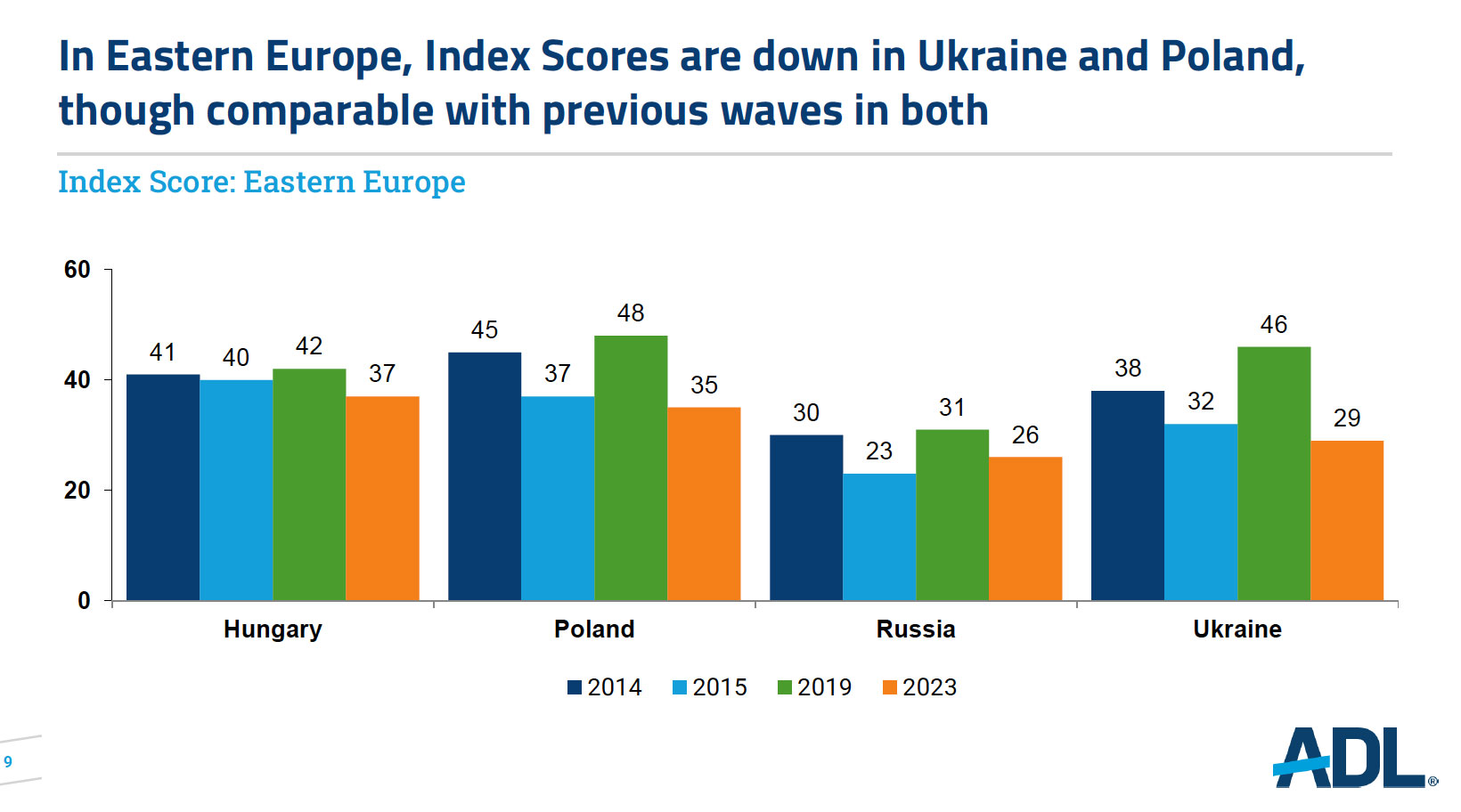(RNS) — A new survey measuring antisemitic attitudes across 10 European countries includes a surprising — and welcome — finding.
In the Eastern European countries of Hungary, Poland, Ukraine and Russia, where pernicious stereotypes of Jews have historically been higher, there was a marked decrease in antisemitic attitudes since 2019, when the survey was last fielded.
Among those countries, the decrease was most pronounced in Ukraine — where the percentage of the population harboring antisemitic attitudes fell from a high of 46% in 2019 to 29% in 2023.
Call it the Zelenskyy effect.
“The dramatic improvement in antisemitic attitudes in Ukraine seems linked to the popularity of President (Volodymyr) Zelenskyy, a leader who is both proudly Jewish and public about his heritage,” said Jonathan Greenblatt, chief executive of the Anti-Defamation League, which released the survey Wednesday (May 31).
“While the survey findings do not directly address questions of causality, there’s no doubt that having a Jewish president who is being praised for his response to Russian aggression seems to have affected perceptions of Jews among ordinary Ukrainian citizens,” Greenblatt said in a statement.
Zelenskyy, with his trademark combat boots, khaki pants and green T-shirt, has come to personify the nation’s courage and determination in the face of the Russian assault. As arguably the world’s most famous Jew, he may be contributing to a decline in antisemitic attitudes not only in Ukraine but also in neighboring Poland to the west and Russia to the east.
The European survey is the latest installment of The ADL Global 100: An Index of Antisemitism, first conducted in 2014. The most recent survey included 6,569 randomly selected adults in 10 European countries (six in the West and four in the East).
The survey, fielded between November 2022 and January 2023, asked respondents 11 questions to try to measure negative Jewish stereotypes, such as “Jews have too much power in the business world,” and “The Holocaust is a myth and did not happen.” Survey respondents who said at least six out of the 11 statements are “probably true” were considered to harbor extensive antisemitic attitudes.
In Western Europe, the Netherlands had the lowest antisemitic score, meaning 6% of its population harbored antisemitic attitudes. The United Kingdom, Germany and France followed. Of the six countries in Western Europe, Spain had the highest antisemitic index score — 26%.
By comparison, the United States has an antisemitic index score of 20%, meaning 1 in 5 Americans harbors antisemitic attitudes. The U.S. rating was most like Belgium, which scored 22% on the index.
RELATED: Lawyers for Pittsburgh synagogue defendant admit he carried out deadliest US antisemitic attack
Antisemitic attitudes dropped, if marginally, across the 10 countries surveyed. But they dropped most significantly in the East.
“The trends they are reporting are good news,” said Leonard Saxe, a social psychologist at Brandeis University who directs the Steinhardt Social Research Institute and Cohen Center for Modern Jewish Studies. “There are decreases especially in areas where stereotypical Jewish attitudes have been highest.”
Given the ongoing fighting, Saxe said he wasn’t absolutely certain that Zelenskyy could be credited with the drop in Ukrainian antisemitism.
“I’d be at the head of the line in wanting to think that’s the case,” he said. But, he added, the wartime chaos might make it difficult to field a survey that would adequately compare to surveys two or four years earlier.
Saxe questioned some of the index questions. One of them asks if Jews are more loyal to Israel than to the country they live in. A person answering “yes” may not necessarily be antisemitic, he suggested.
“It’s not like European countries are having a conflict with Israel where you have to choose sides,” he said.
Support for boycotting Israel was very low in all the countries polled. Europeans mostly reject the use of boycott, divestment, and sanctions against Israel.
In addition, Holocaust education, the survey found, appeared to have made some inroads. “Outright denial of the Holocaust is nearly nonexistent in Europe,” the survey notes.
The survey’s margin of error was plus or minus 3.1 percentage points for Russia and Ukraine and plus or minus 4.4 percentage points for the remaining eight European countries. Impact Research conducted and coordinated fieldwork and data collection for the survey.
RELATED: Can Pope Francis bring peace to Ukraine?






